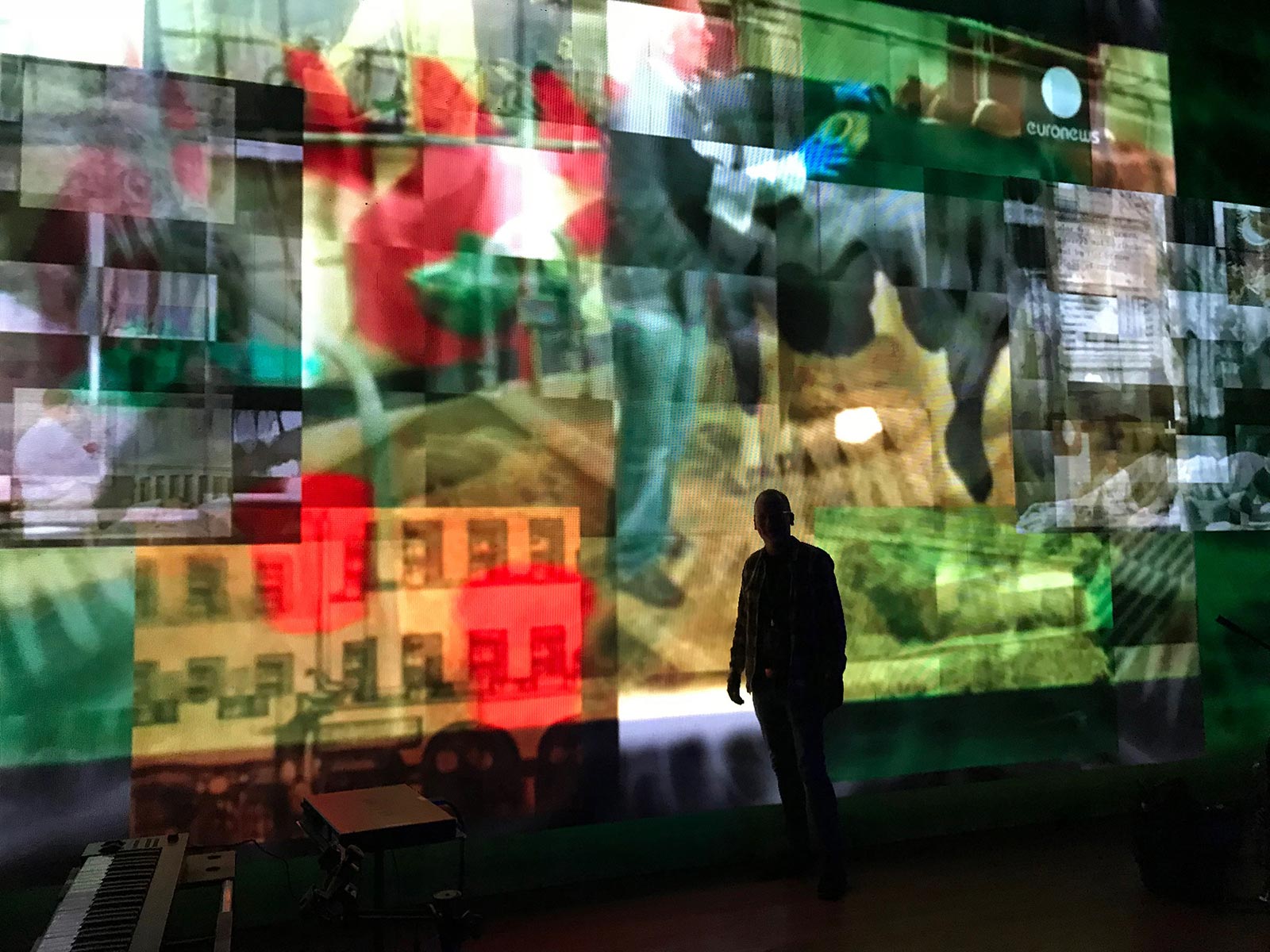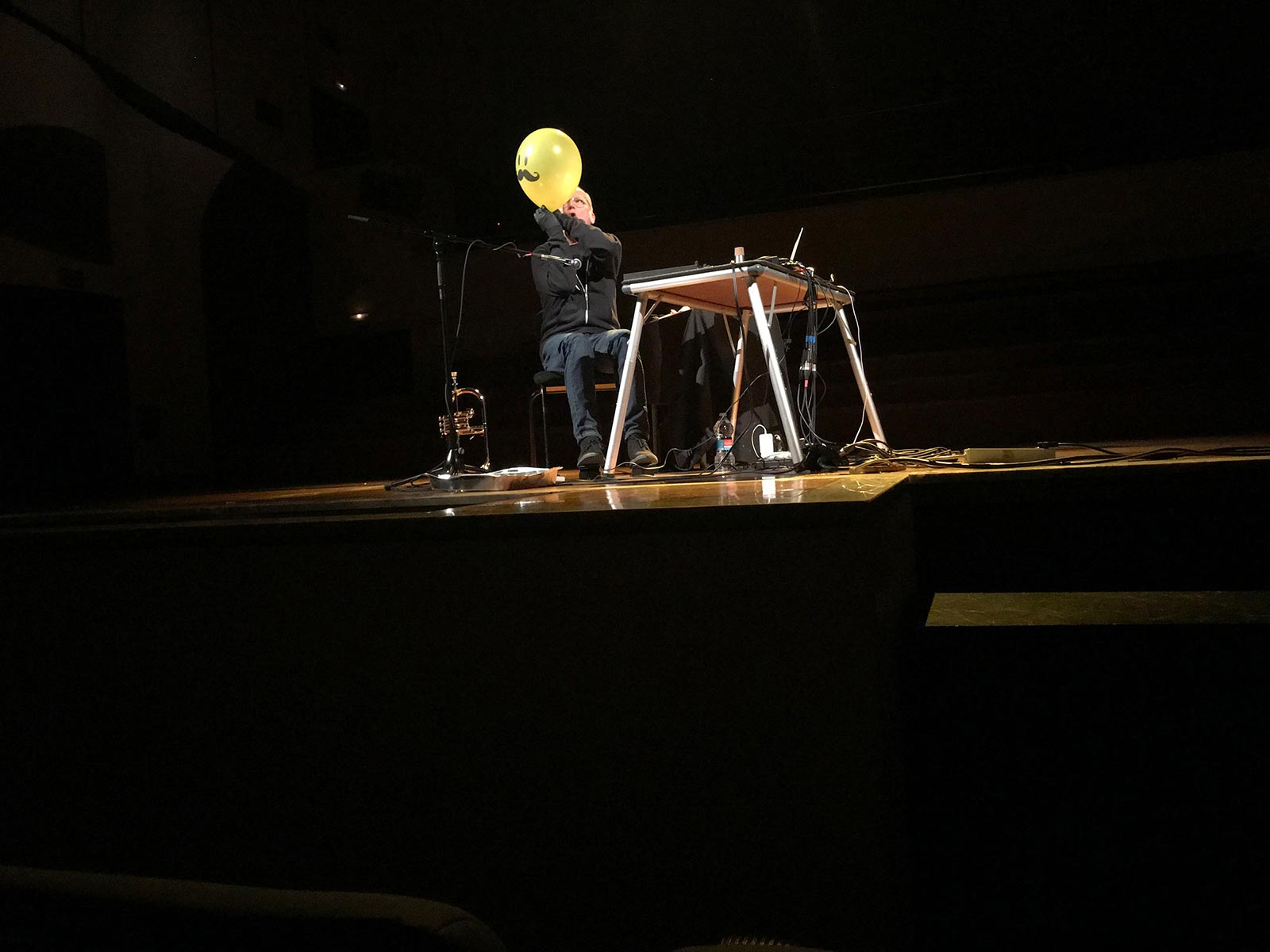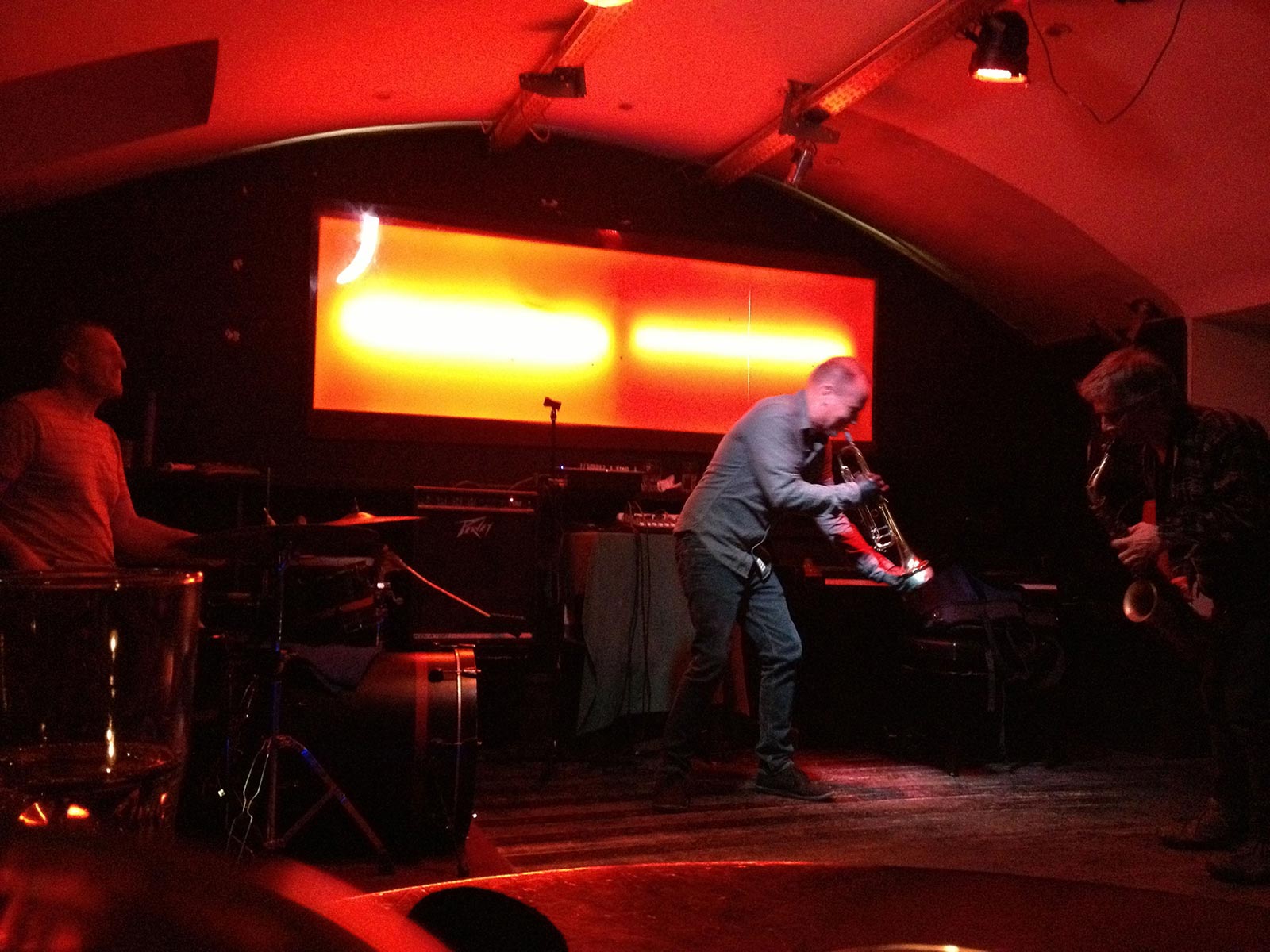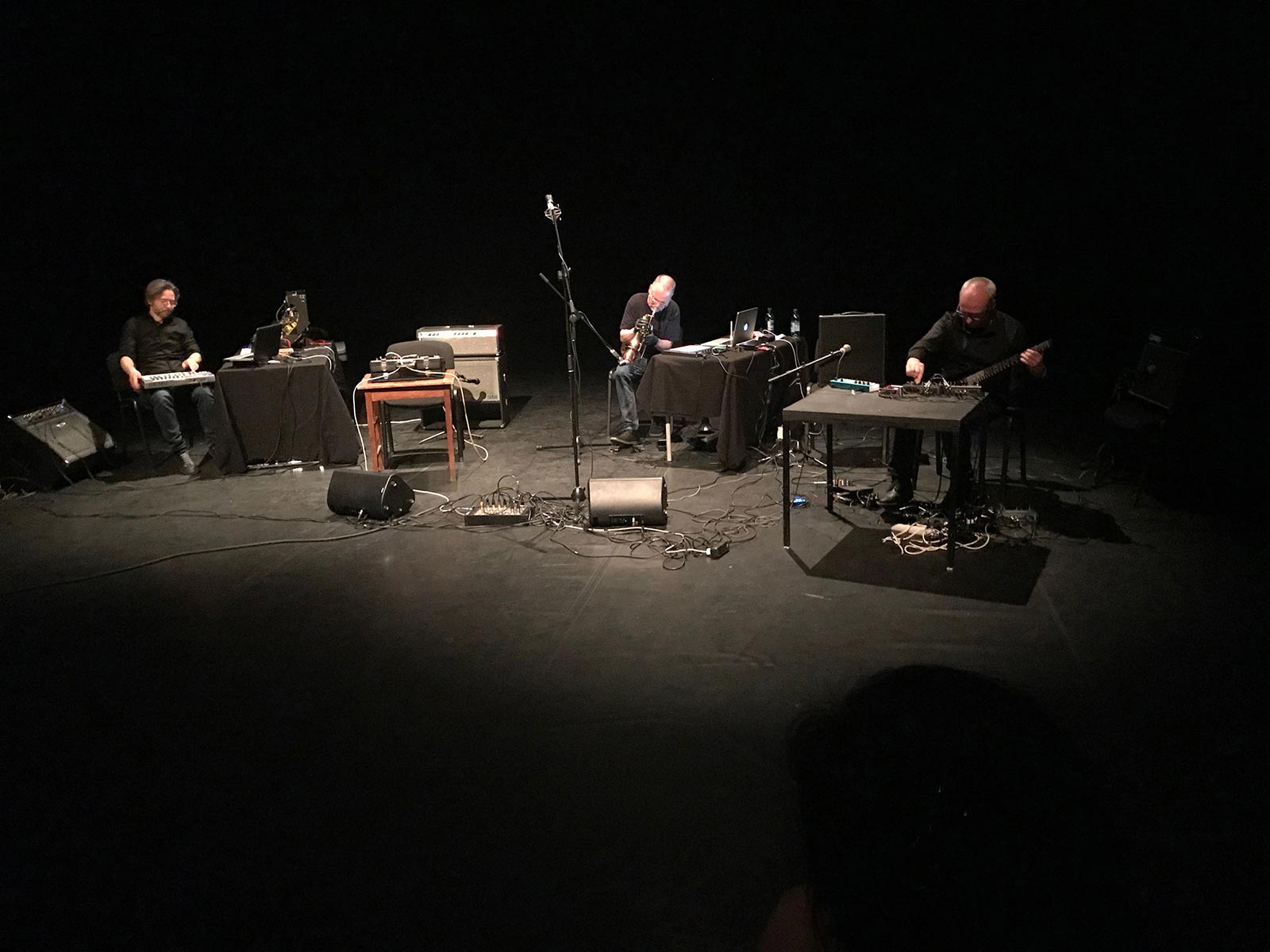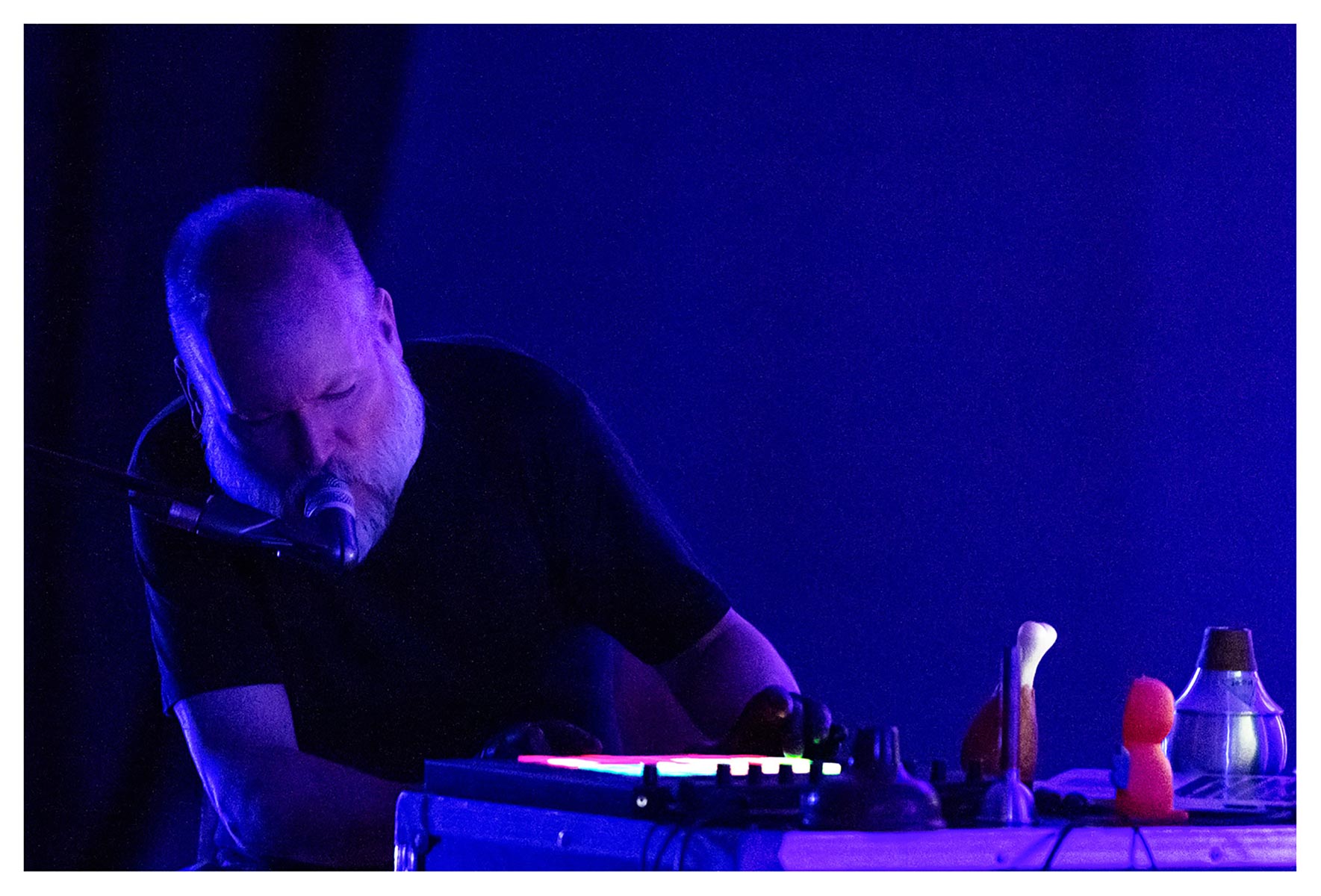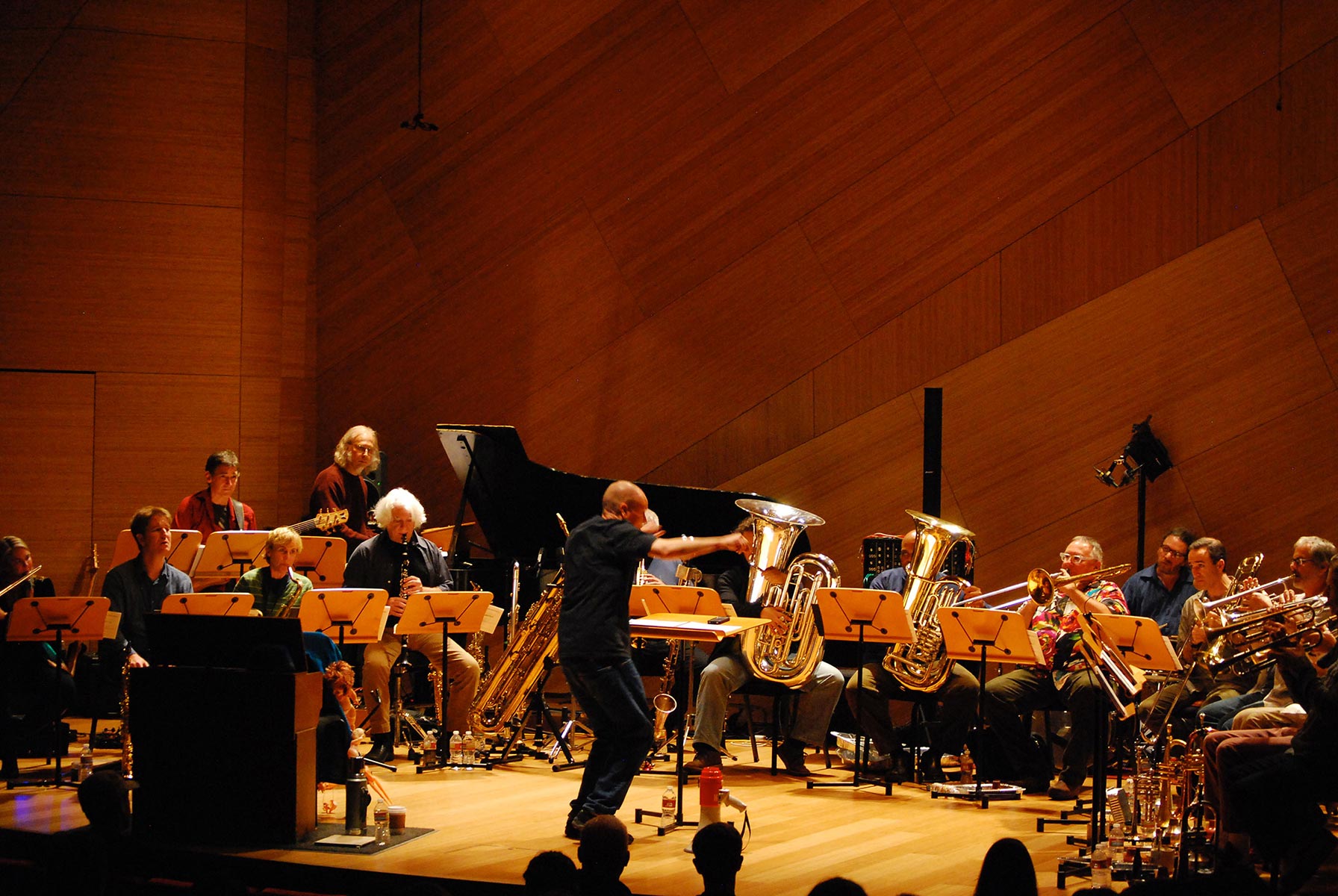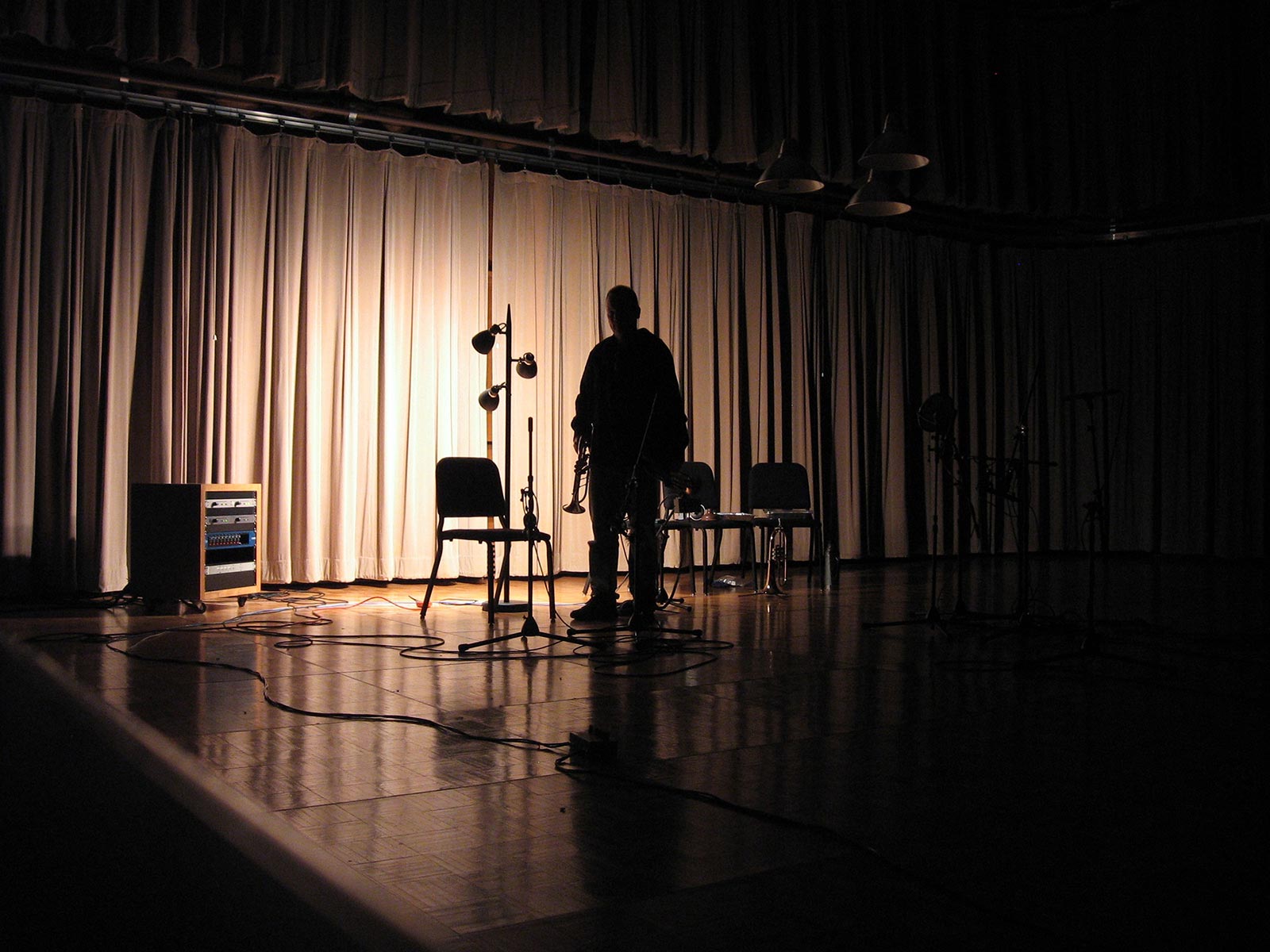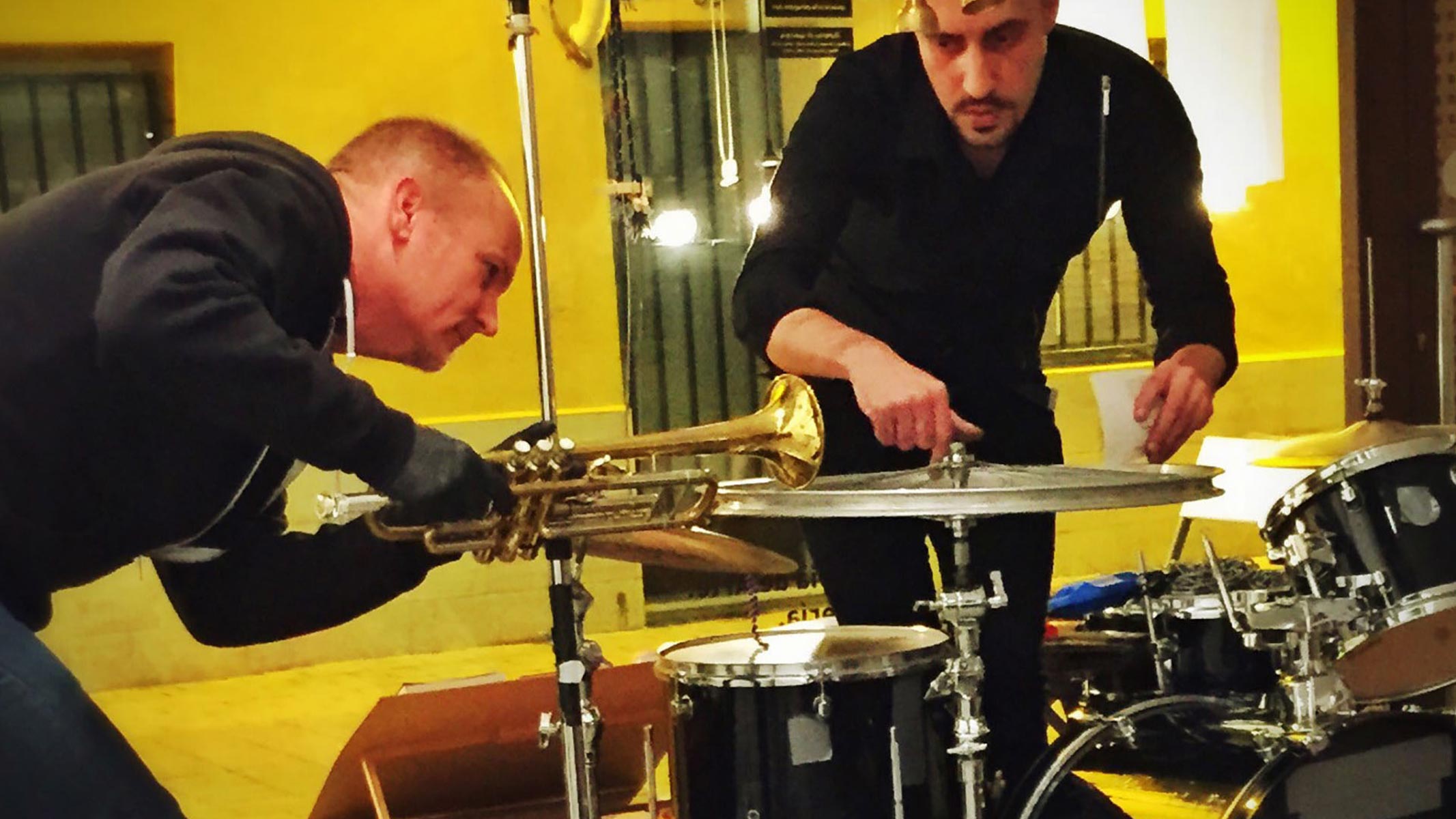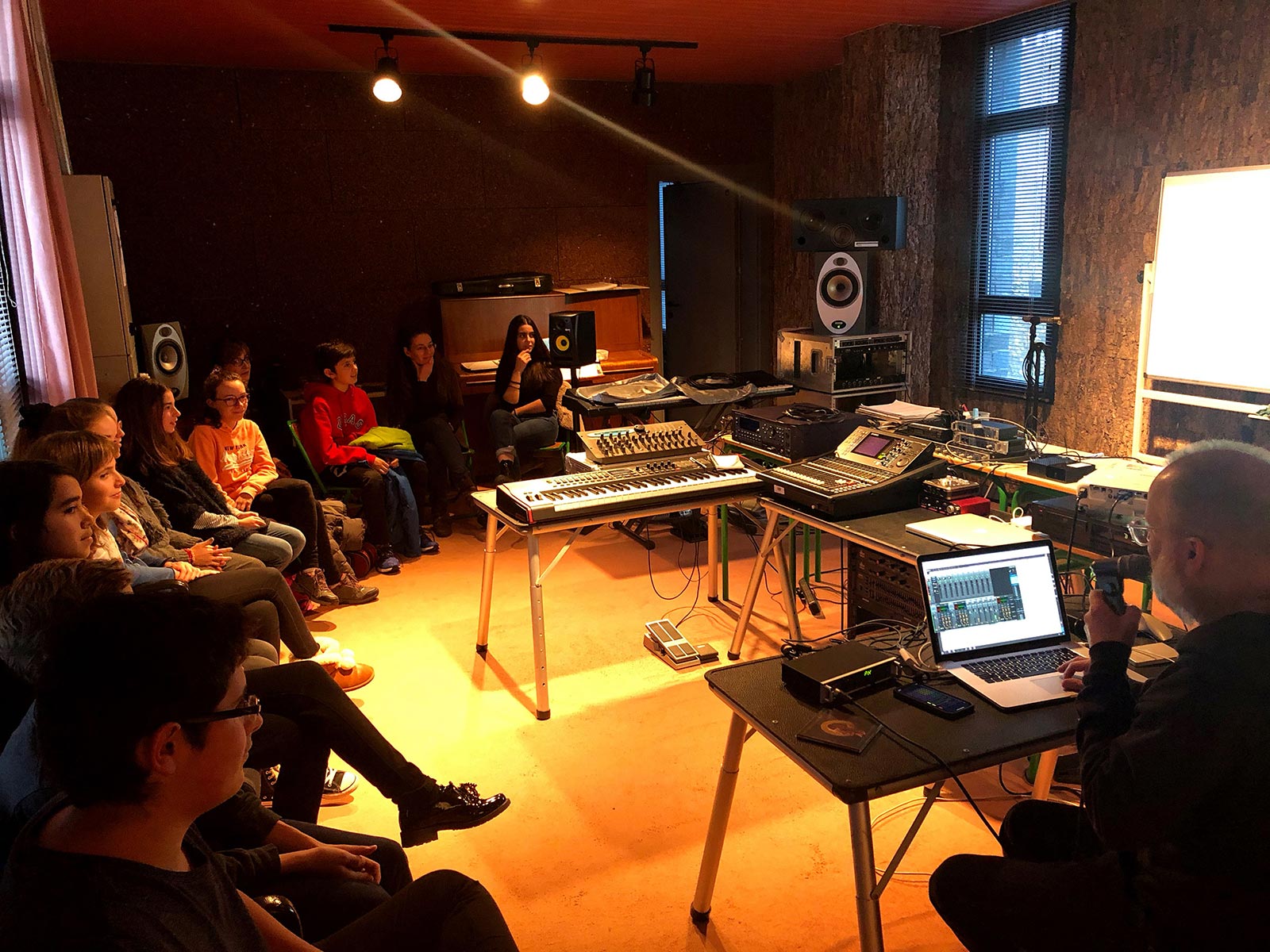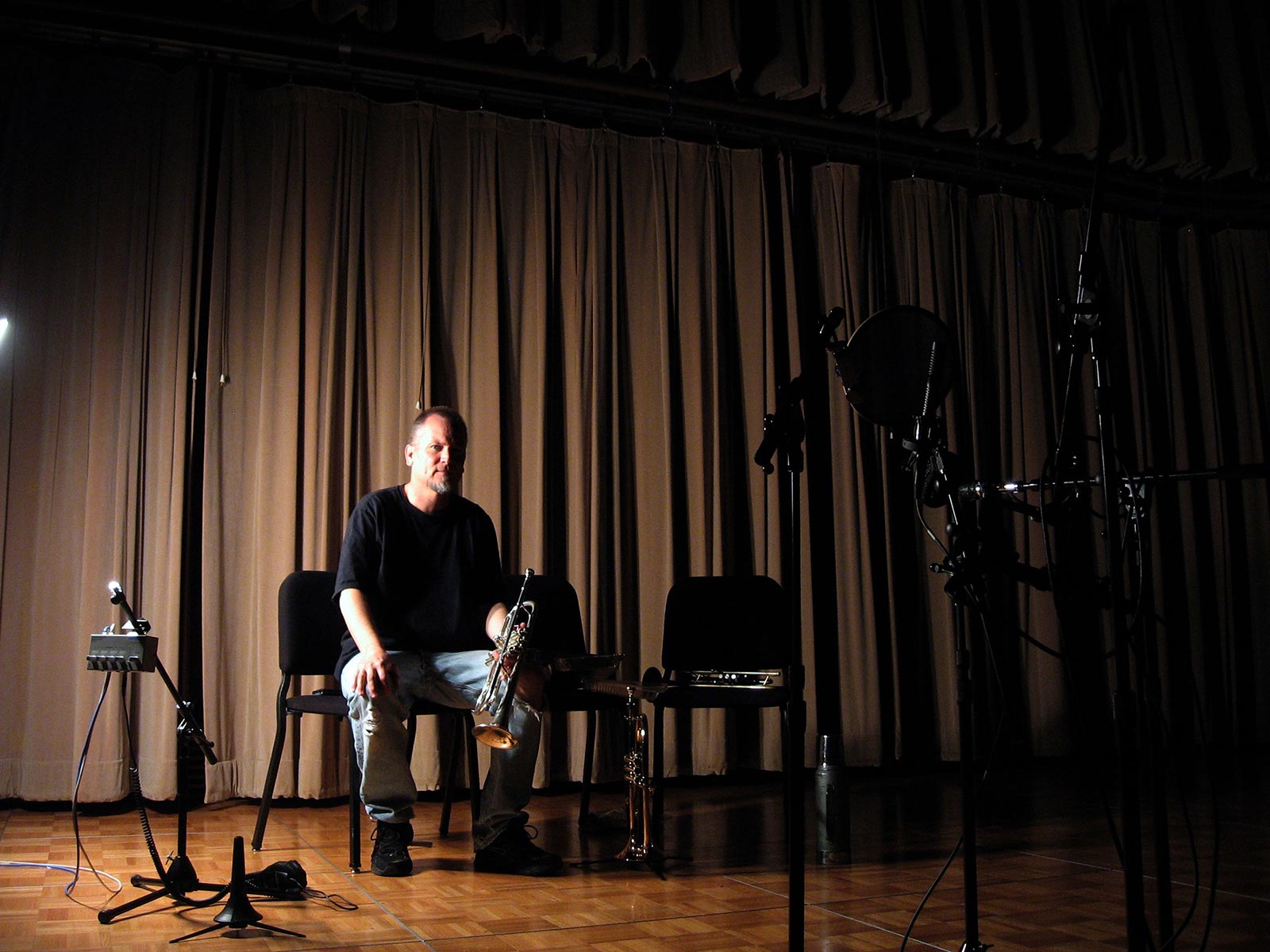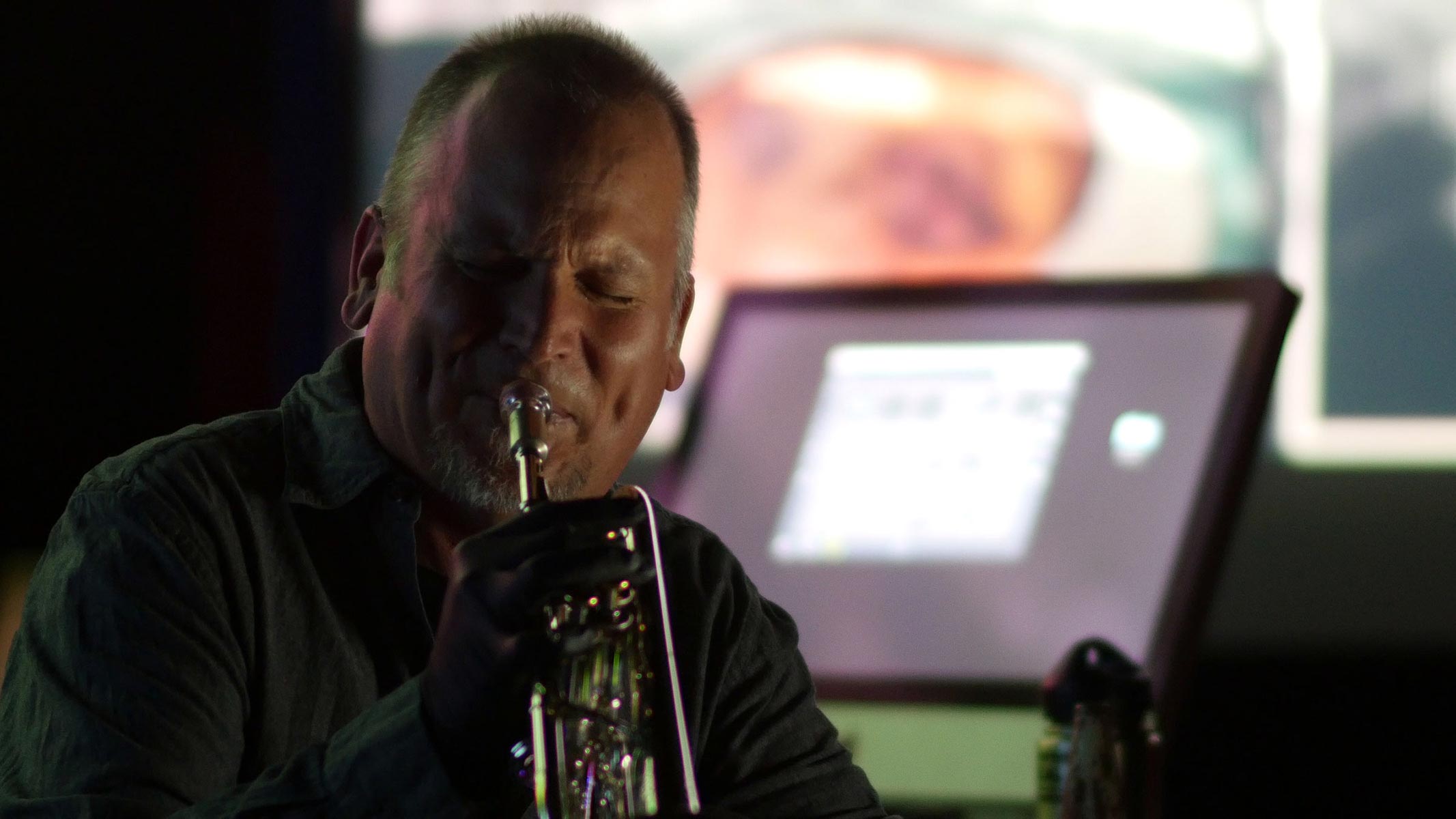
Jeff Kaiser — Trumpet, Electronics, Improvisation, and Music Technology
Critical Acclaim
Jeff Kaiser’s solo performance was a “manic, hallucinogenic joyride through time, space and tonal distortions. He took some of the extended techniques of Lester Bowie and Bill Dixon, and stretched them past the breaking point. He would bend a note, transpose it to an impossible octave, and then send it spinning around the room like a remote-control airplane...He’d sample a phrase and distort it beyond recognition, causing it to ricochet around the space in pink and white noise reiterations. Kaiser’s set was unbelievably creative…” —AllAboutJazz.com
“[A] recurring highlight of each MOXsonic festival has been a performance by the Choir Boys, a duo consisting of Jeff Kaiser on trumpet and electronics and saxophonist Andrew Pask. This year as part of the Friday Nightlife concert they performed with Len Lye’s bizarre, hand-drawn 1929 film Tusalava. The results were mesmerizing and disturbing…I was glad space was made for this because live performances by Kaiser are not to be missed.” —Computer Music Journal, MIT
“This is exciting music ranging from almost silence to tutti passages, from intricate suspenseful passages formed by repeated sixteenth notes to forming a tapestry on which the soprano sax can solo. It’s a colossal work which merits repeated listening sessions.” —Vital Weekly
“Free jazz trumpeter/electronics specialist Jeff Kaiser is a man of diverse talents. He has mastered many facets of horn-playing that most brass specialists never consider…The musician takes the aesthetics of trumpet firebrands like Lester Bowie and Bill Dixon and crafts his own personal language from those advancements, coupled with a specialized computer program that allows him to use multiple effects and sound-shaping tools to completely distort and expand the original signal far beyond its source…Kaiser’s music is fierce and uncompromising, often taking listeners on a sonic adventure they might not be prepared for.” —NBC San Diego
Musician, Technologist, Trumpet Player, and Scholar
About Jeff Kaiser
Short Biography
Jeff Kaiser is a musician, technologist, trumpet player, scholar, composer, and conductor who creates adventurous, interactive performances blending acoustic instruments with custom software, generative systems, and live electronics. Rooted in experimental jazz, improvisation, and contemporary composition, his work explores the sonic possibilities of combining traditional instruments with new technologies while engaging space and audience as active participants. Kaiser has performed and presented worldwide, from Europe and Asia to the Americas, and leads ensembles including the twenty-plus piece Jeff Kaiser Ockodektet. A tireless promoter of experimental music, he founded the pfMENTUM label, co-directs the MOXsonic Festival, and develops innovative tools for live performance and improvisation. Kaiser is also an educator and scholar, holding a PhD in Integrative Studies (Music) from UC San Diego.
Full Biography
Jeff Kaiser is a trumpet player, composer, conductor, media technologist, and scholar whose work combines acoustic performance with emergent technologies to create immersive, interactive musical experiences. Classically trained in trumpet and composition, Kaiser integrates traditional instruments with custom interactive and generative software and hardware, creating performances where space, audience, and sound are all active participants. His music draws inspiration from experimental improvisation, cognitive science, and the rich timbral possibilities of combining instruments with new and repurposed technologies. Rooted in jazz, improvisation, and Western art music traditions, his work spans audio-centric projects as well as live video, tracking, and generative systems.
Kaiser earned a PhD in Integrative Studies (Music) from the University of California San Diego, working across creative, technological, and scholarly domains. These pursuits inform one another in his work. For example, his ethnomusicological research on improvisation with new technologies led to a formal definition of improvisation, which in turn inspired a software-based machine-improvisation algorithm now used in solo and commissioned works worldwide.
An active international performer and educator, Kaiser has presented concerts, masterclasses, and research in Austria, China, England, Estonia, Germany, Mexico, The Netherlands, Spain, Sweden, and throughout the United States. Even during pandemic lockdowns, he maintained performances and presentations remotely from his studio.
Kaiser is a tireless promoter of experimental music. He founded and directed the pfMENTUM music label (1999–2022), releasing over 150 recordings featuring 700+ artists across genres from avant-blues to electro-acoustic experimentation. He also founded the Ventura New Music Concert Series (1990–2007) and co-directs MOXsonic, the Missouri Experimental Sonic Arts Festival (2018–present), known for its focus on interactive music technology and praised by MIT’s Computer Music Journal.
Kaiser has also served as a consultant with administrators and directors with other universities, high schools, festivals, concerts, series, and events.
Outside of music, Kaiser enjoys restoring and driving his 1966 Porsche 912.
Creative Practice
Musician
Jeff Kaiser’s work as a trumpet player, electronic musician, composer, conductor, and more, is documented on over sixty full-length recordings including releases on Clean Feed Records (Portugal), Cuneiform Records (US), Leo Records (UK), Mother Brain Records (US), NineWinds (US), Orenda Records(US), Sinkro Records (Spain) and his own label, pfMENTUM, and more.
Kaiser has maintained an active international career, performing at prestigious events such as Musicacoustica at the Central Conservatory of Music (Beijing, China) where he also served as a jurist for an international composers competition, the International Society for Contemporary Music (ISCM) World Music Days (Tallinn, Estonia), Bernaola International Music Festival (Bilbao, Spain), the Vision Festival (New York), the Festival of New Trumpet (New York), the grand opening of the REDCAT Theater at Disney Concert Hall (Los Angeles), as well as at concert halls, clubs, universities, colleges, music conservatories, and art galleries in Austria, China, England, Estonia, Germany, Mexico, The Netherlands, Spain, Sweden, and throughout the United States.
As a conductor, Kaiser has directed many ensembles—with a focus on improvisation-oriented groups, his own operas and large ensembles, and is a former music director for the Ojai Camerata which is a vocal ensemble specializing in early and contemporary music.
Finally, as a producer—as well as recording, mixing, and mastering engineer—Kaiser has been personally involved with the production and release of hundreds of recordings from experimental to popular.
Technologist
Jeff Kaiser is an interdisciplinary creative practitioner who authors, develops, and performs with his own software and hardware interfaces for live digital signal processing in both audio and visual domains. He has a long history of collaborative work across the arts, partnering with dancers, poets, actors, visual artists, historians, and musicians to explore innovative approaches to performance and interaction.
Kaiser’s ongoing research in software development focuses on improvisational approaches to audio spatialization using spectral and pitch-based analysis, video tracking, and other gesture-based interfaces. He also creates interactive and generative software tools designed to free performers from being tied to a computer screen while on stage or in the studio. To pursue these innovations, he has participated in five artist residencies at STEIM (STudio for Electro-Instrumental Music) in Amsterdam, a historic center for electro-instrumental research.
Kaiser also develops and freely shares software in Max (Cycling ’74), including the popular KaiserLooper live-looping platform, KaiGen generative tools, I-Ching patches, and other interactive tools. Three of his controller packages—jk.push (for Ableton Push 2), jk.lpx (for Novation Launchpad X), and jk.softstep (for Keith McMillen SoftStep 2)—are officially published in Cycling ’74’s Package Manager.
Beyond his own creative work, Kaiser consults with a wide range of music and visual arts practitioners—from experimental musicians to EDM artists—assisting in designing audio signal processing workflows and implementing interactive video tracking and projection systems.
Scholar
Jeff Kaiser is actively engaged in multiple research and writing projects exploring the creative, technological, and pedagogical dimensions of music technology. His first manuscript-length text, Building Loopers in Max (co-authored with Gregory Taylor), is scheduled for release in early 2026. Building Loopers in Max is a freely available, open-access, fully digital pedagogical tool that provides instructional text and patching examples, enabling students to construct live-looping tools in Max, gen~, and RNBO, to foster technical fluency and creative musical exploration.
His second book, in progress, Loopers: Aesthetics, Technologies, and Creative Practitioners (co-authored with Gregory Taylor), investigates the aesthetics of repetition in music, ethnographic perspectives from musicians who use loopers, and software examples illustrating different types of loopers in performance and production.
His third book, in progress, Improvising Technology: Virtuosity, Machines, and Interagency, provides an ethnographic study of contemporary musicians working with new, repurposed, and reinvented electronic technologies. Kaiser examines how these musicians conceptualize their practice, notions of agency and virtuosity, and the ways artists, audiences, and critics establish value in emerging fields. The project includes approximately thirty interviews with prominent technologist-artists, including guitarist Nels Cline (Wilco), avant-garde turntablist Maria Chavez, trumpeter-composer Wadada Leo Smith, and Ableton Live co-creator Robert Henke. The manuscript explores how technologies both shape and are shaped by musical communities, offering insight into the social and sonic impact of creative tools.
Kaiser has also published extensively on music technology and improvisation, including the journal articles Improvising Technology, Constructing Virtuosity (tri-lingual journal Cuadernos de Música, Artes Visuales y Artes Escénicas), The Automation of Surprise: Improvisation, Controlled Hallucinations, and the Predictive Mind (published in Ideas Sónicas, CMMAS), and, with his KaiBorg duo partner David Borgo, Configurin(g) KaiBorg: Interactivity, Ideology, and Agency in Electro-Acoustic Improvised Music (Beyond the Centres: Musical Avant-Gardes Since 1950 – Conference Proceedings, Thessaloniki, Greece). These works explore the interplay of technology, agency, and creative practice, highlighting how contemporary musicians configure electronic tools and improvisational systems to shape both sonic and social experiences.
Ensembles and Collaborations
Kaiser composes music for a variety of ensembles—from large to small, instrumental to vocal, acoustic to electronic—employing a hybrid notation of traditional and graphic elements. His large ensemble, The Jeff Kaiser Ockodektet, is a twenty-plus piece group that includes brass, percussion, strings, woodwinds, as well as Theremin, modular analog synth with laptop, heavily electronically effected and prepared contrabass guitar and, on occasion, choir. A performance of the Ockodektet was selected as the jazz concert of the year in the San Diego Reader. He has also performed on major television shows and films.
He collaborates in several specialized electro-acoustic duos. The Choir Boys (with Andrew Pask) draws inspiration from Bobby Bradford and John Carter recordings; KaiBorg (with David Borgo) emphasizes custom hardware and software for improvisation; The Desert Fathers (with Gregory Taylor) explores shifting foreground and background in complex drone environments; Duo Cataclysma (with Seth Andrew Davis) focuses on interactive technology and virtual agents; and Made Audible (with Trevor Henthorn) focuses on sonification of large political and scientific datasets, producing a suite of generative plugins for Ableton Live and Max/MSP known as KaiGen.
Education and Leadership
Pedagogy and the changing landscape of music technology are central to Kaiser’s research. He advocates for equitable access to professional-quality audio production tools through initiatives such as Why Reaper?, challenging entrenched ideas of industry-standard gatekeeping. Kaiser has published and presented extensively on music technology education, including the journal articles Developing a Curiosity-Centered Pedagogy for Music Technology (Journal of the Association for Technology in Music Instruction), Developing a Pedagogy and Framework for the Analysis of Contemporary Electronic Music (International Computer Music Conference), and The Death of ‘Industry Standard’ (Audio Engineering Society’s Breaking Barriers in Audio). A long-standing participant in digital humanities, Kaiser served on the University of San Diego working group and was an original member of the NEH-sponsored digital humanities pedagogy initiative. His research has been presented internationally, including studies on musicians’ use of metaphors at the symposium Naming, Understanding, and Playing with Metaphors in Music.
As an educator, Kaiser has taught a wide range of undergraduate and graduate courses, covering ethnomusicology, creative software design, music business practices, interactive arts technology, audio production, digital composition, music technology and culture, contemporary electronic music analysis, and technology-based performance at institutions including the University of San Diego, UC San Diego, UC Irvine, MiraCosta College, and the University of Central Missouri, where he currently serves as Associate Professor of Music Technology and Composition. At UCM, he has helped develop the Master of Arts program with a music technology pathway, introduced new graduate courses, and redesigned undergraduate offerings.
Kaiser’s experience also extends to arts administration and entrepreneurship: he helped develop the Arts Entrepreneurship Minor at the University of San Diego and previously served as Director of Development for the Center for World Music.
Kaiser holds a PhD in Integrative Studies (Music), an MM in Choral and Orchestral Conducting from Azusa Pacific University, and a BA in Music Composition from Westmont College.
Awards and Recognition
Kaiser has received numerous awards, grants, and commissions for works including choral music with electronics, a large-scale multi-building improvisation-based electro-acoustic work, several chamber operas, an oratorio, a video/music installation in a decommissioned women’s prison and performances on television and film scores. Commissions include the Ojai Camerata and California Lutheran University, to name a few. He has received twenty ASCAP Plus Awards, awards from universities and colleges, fourteen Individual Artist Fellowships from the City of Ventura, three Forum of the Arts Grant administered by the Ventura County Museum of History and Art, several Subito grants from the American Composers Forum, and more.
Organizational Affiliations, past and present, include: Association for Technology in Music Instruction, The Society for Ethnomusicology, The International Society for Improvised Music, The International Computer Music Association, Audio Engineering Society, The International Trumpet Guild, The Society for Electro-Acoustic Music in the United States, and The American Society of Composers, Authors and Publishers

